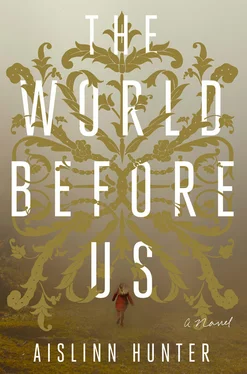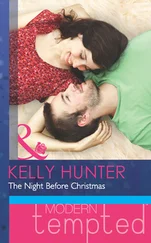Mr. Farrington hopes that they did not suffer from their long walk . The letter he wrote to the Whitmore after Leeson and Herschel showed up at the manor wasn’t warmly or personally addressed, but it seems to indicate that Farrington wasn’t a stranger. He mentioned Inglewood by name but didn’t feel the need to contextualize himself or his estate. Jane does a quick calculation: he was moderately renowned as a botanist in 1877, but not so famous that he might eschew the convention of declaring himself and his relationship to the Whitmore at the start of a letter if he were a stranger to those with whom he was corresponding. Instead he presents his compliments .
Jane gets back into bed and turns off the lamp, sure now of her conclusion. George Farrington knew the Whitmore — he must have been familiar with it; he stated in his letter that it was a long walk to his estate. And if Herschel, Leeson and N had found their way to one of the most famous residents in the area, maybe that resident had also, at some point, made his way to the Whitmore — as a member of the public invited to the summer ball some two months before N went missing.
“Lancers!” shouts Cat, “and galops. I think she’s on to something now!”
The musician turns to Cat and slides his right hand out in front of himself, making a buzzing sound with his lips and then the waa-waaa of a brass instrument.
“Is it what you expected, Mr. Farrington?” the poet demurs, mimicking a woman’s haughty tone.
“Who said that?” Cat asks, and the poet clacks his teeth like a wild animal.
“Punch,” the musician shouts again, “in crystal glasses,” and some of us can taste it: the pleasant fizz of soda and the tang of fruit, bits of apple settling lightly on our tongues.
After a short debate, we decide that Jane was right about the orchestra and Cat was correct about the dances. While Jane sleeps we imagine ideal versions of possible selves: hair coiffed and held perfectly in place, an evening so cool we did not feel the sweat pooling under our shirts. All of us so hungry for memory we will take it any way it comes, even see it as Jane envisions it: the papier-mâché banners and profusion of candles, the wood floors gleaming. Those images are set against the fragments we think we can remember — bits and pieces we puzzle over as we move into the long night ahead. The boy says, “I’ve never been to a ball,” and the girl whispers, “Me neither,” and Cat air-kisses their heads and says, “But it is such a lot of fun!” She whisks around the room so they can sense her dancing while Sam sits up to oouuff at us in the dark.
In the summer of 1877 the orchestra was more spirited than it had been the year before, in part because it was made up of more patients — Alfred Hale amongst them, wearing a large paper collar and playing an admirable trombone. There had been the usual round of dance lessons in the weeks preceding the ball for those who were untrained or who lacked confidence. The men and women had been allowed to practise together in the final week after instruction in their own gendered wards. Now, let loose under the high-ceilinged, rose-festooned room on the actual evening, there was some confusion about roles — some women taking the lead as some men rested their arms lightly on top of their partner’s. The warders in their dark-blue uniforms stepping in to send overenthused gentlemen on their way, intent that no advantages be taken. Noble separated us when it suited him. Bream was tolerant, going so far as to join in for a spin when the fancy took him, though he gripped so tightly on the turns with his sausage fingers some of us worried he’d leave behind a row of bruises lined up like the keys of a flute.
Before he took the quadrille with Sallie Herring — who had plucked out so much of her hair she’d been given a bright yellow felt cap to wear — Superintendent Thorpe had been stationed at the head of the receiving line. Leeson had stood beside him briefly, bowing and shaking hands with the first few guests and introducing himself as a commissioner, winking hopefully at the Superintendent as if it were all in shared fun. He was quickly relieved of this assumption. Shortly thereafter, a dapper gentleman in a frock coat with a velvet collar and a bright yellow boutonnière came in through the double doors. By the time he and the older woman accompanying him reached Thorpe and the Matron, Leeson was hiding farther down the queue, the superintendent having stuffed a cigar into his pocket in exchange for better behaviour. Leeson bowed at the woman, who was ahead of the gentleman in the processional, and she nodded her head hastily in his direction, the peacock feathers nestled in her hair arcing toward Leeson so that he had to restrain himself from reaching up to bat them away.
Ask us what we remember of a night like this and the women will tell you about the feel of gloves on their arms again, about the shift of a corseted dress, the weight of the bustle, about how the men’s starched collars lifted their chins so that they seemed to be looking down their noses at you when they presented themselves for a dance. The men remember how the candy colour of a dress hung in their eyes, how there was a promise of brandy, how the true choreography of the evening lay in trying to arrange a secret meeting with the woman of their choice.
By nine Hopper had started to follow Eliza Woodward, eventually stealing a kiss from her behind a potted fern, the pillow of her lips a pleasant surprise. Hale was less lucky: he spilled his punch on Sallie’s skirt and Sallie pulled his ear in return. The night was a mix of distractions: the fit of new shoes, the increasing warmth of the room as the dancing continued, squares of cool air radiating off the glass panes of the windows along with our reflections. The room casting us back in our best suits and dresses, colouring the body back in.
Sitting on the floor beside Jane’s bed, head bent in concentration, Cat can see herself in sea-green satin, can remember her lips on John Hopper’s in an alcove behind the fern. John, sitting beside her, is aware suddenly of his own former body: his hair stubbly but growing back after another enforced shaving. The two of them side by side as Jane goes on dreaming and we go on remembering the ball. The shape that is Cat whispers to the shape that is John, “How did you guess your name?”
We gather that we knew some of the guests personally, and others by reputation: the Magistrate and Commissioners existing in name only, as was the case with most of the local businessmen and their wives. The poet knew George Farrington because the week before the ball the Superintendent had placed a slim red volume of Farrington’s poetry into his hands, suggesting that he might find it interesting. “The book,” the Superintendent had said earnestly, sliding it across his desk, “exudes a quality of liminal thought of the sort presently admired in literary circles …” This statement was, of course, pure condescension — the Superintendent thoughtlessly implying that due to his incarceration, the poet had no access to the pulse of current conventions. Sensing his mistake, he tried again. “It’s simply that as a fellow wordsmith I thought you might feel a kinship with the man and his work.” The poet, however, found Farrington’s work banal, bordering on trifling, and he barely gave it a second read, though he prided himself on being open-minded. His own offerings had, in their infancy, been widely misunderstood and even mocked in the pages of some of the better magazines. When he’d still been free — which was how the poet termed the period of time before his marriage to the succubus — he’d often been chastised by his friends for continuing to write when the evidence against his having talent weighed so plentifully against him.
Читать дальше












